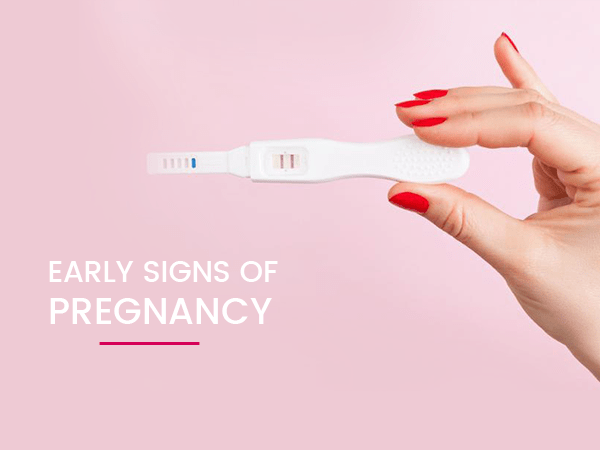When you’re trying to conceive, any slight new symptom can get your heart pounding. Waiting to see if two pink lines are in store for you this month can be agony, so it’s hard not to read into every twinge, cramp and extra trip to the bathroom. But what are the first signs of pregnancy you should really be on the lookout for? We break down the most common early pregnancy symptoms and what you can do to ease any ensuing discomfort. There’s no hard and fast rule for when early pregnancy symptoms kick in. Some women may begin noticing the first early signs of pregnancy a week or two after conception, while others will start to feel symptoms closer to four or five weeks after, when your period is conspicuously late, or even farther into pregnancy.
Following are the symptoms:
- Missed period
Often the first tipoff of pregnancy, a missed period might make a woman wonder if she could be expecting. However, there are other reasons for missing a period. Perhaps a woman is not keeping track of her menstrual cycle, or maybe its length is irregular from month to month. Other explanations for why a woman could be late include excessive exercise, gaining or losing too much weight, stress etc.
- Bleeding/spotting
Two weeks after conception occurs, a pregnant woman may experience a scant amount of vaginal bleeding or light spotting. The blood may be pink to brown in color, and it may also be accompanied by mild cramping, so a woman may think she is about to start her period.
Six weeks after a missed menstrual cycle or two weeks after conception, a woman may notice that her breasts feel fuller, and her nipples may be more sensitive. This is caused by increased levels of the hormones progesterone and estrogen, as well as increased blood flow to this area.
- Fatigue
Being exhausted is very common during the first trimester of pregnancy, as well as during the last few months before delivering. This is most likely caused by rising levels of the hormone progesterone in early pregnancy. Women may notice they feel more sluggish and sleepy than usual as early as one week after conception.
- Morning sickness
Women may begin to feel sick to their stomachs between the sixth and twelfth weeks of pregnancy, and some women may start to feel relief by week 14. These symptoms are likely triggered by the hormonal changes of pregnancy. To ease the symptoms, begin eating small, frequent meals, resting as much as possible, choosing blander foods without strong smells and drinking ginger tea.
- Bloating
In the early weeks of pregnancy, a woman may not yet be showing, but her abdominal area may feel softer and fuller, Moss said. This is likely caused by increased levels of the hormone progesterone, she explained.
During the early months of pregnancy, a woman may feel like she is on an emotional roller coaster as changes in hormone levels affect her body and mind. Besides adjusting to shifting hormone levels, a woman’s moodiness can also be caused by some of the physical changes of early pregnancy, such as fatigue and morning sickness, as well as the emotional changes in her life, including the stress of becoming a parent, worries over having a healthy baby and financial concerns about adding a new family member.
- Changes in urination and bowel movements
Frequent bathroom visits happen in early pregnancy because the kidneys are working harder to filter the extra fluids in the body, such as an increased volume of blood. As the months pass and the fetus grows and develops in a woman’s uterus, it can put pressure on her bladder, causing a need to urinate more often than usual.
Constipation may be caused by extra progesterone, which can slow down the digestive system so that more nutrients can reach the fetus. Pregnancy hormones can also relax muscles that push waste products through the intestines. Being physically active, drinking lots of liquids, and increasing dietary fiber can all help ease constipation.
- Headaches and back pain
Getting headaches is a common symptom during the first trimester. They could be a sign of hunger or dehydration, or may even be caused by caffeine withdrawal, she explained.
Lower back pain, felt more as an achiness, is another complaint of women in early pregnancy. Backaches may be more common during the second and third trimesters, as the growing uterus puts pressure on nerves and blood vessels in the back and pelvis, and also as pregnancy weight gain changes a woman’s center of gravity and her posture.
- Dizziness
Some women may feel dizzy or lightheaded during the early months of pregnancy. The wooziness can be related to low blood sugar or dehydration, as well as to blood shifts in the body, especially when a woman changes position, for example from sitting to standing, or when she gets out of bed. If a woman faints, she should contact her health provider.







,